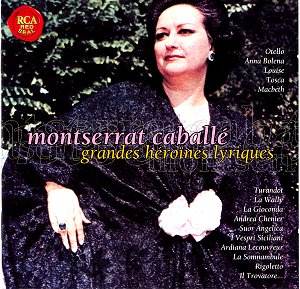This is one of a series
of four 2-CD sets which the RCA Red
Seal label is dedicating to Montserrat
Caballé. I shall be reviewing
the others in due course. The recordings
of this artist have been a part of our
lives for a good while now, yet dedicated
collectors’ mouths will be watering,
for this is not just a reassembling
of well-known RCA material – highlights
from complete opera recordings and so
on – it is made up from the LPs she
made in Spain for Vergara at the outset
of her career and for Columbia about
a decade later. Though her many fans
will no doubt have sought all these
out, it is marvellous to have it all
gathered together on CD, for it represents
the great Spanish diva at her absolute
prime.
But I have a
severe criticism to make, and since
it regards all four volumes I shall
say it once to avoid repeating
myself every time. The presentation
is disgracefully shoddy. It’s not just
the old story that we get a potted biography
of the singer that is the same in each
volume and brief notes on the programme
of each particular album that are richer
in hyperbole than in content – we’re
used to this by now (though why should
we be?). It’s not even a question of
there being no texts or translations,
though that’s bad enough (you can pull
down texts of the arias on this set
from the Internet, but you’d be lucky
to find texts or translations there
of the rarer Spanish material contained
in some of the other albums). The thing
that really makes me see red is that
the enterprise has evidently fallen
into the hands of somebody for whom
the singer is everything, so who cares
if titles and conductors’ and pianists’
and even composers’ names are spelt
wrong, not just here and there but systematically
all through. So we get "L’Elesir
d’amore" (instead of "Elisir"),
the last of the Falla 7 Canciones is
called "Tolo" not "Polo",
then we have "Caro" (instead
of Carlo) Felice Cillario, Anton "Guadano"
(instead of Guadagno), "Mano"
(instead of Manno) Wolf Ferrari and
even Frederico "Monpou" (instead
of Mompou; this is correct on the front
cover but consistently wrong elsewhere).
Most incredibly of all, the romantic
verismo opera "Louise"
is attributed to the baroque composer
Marc-Antoine Charpentier! And, if you’re
going to capitalise surnames, then it’s
Giuseppe DI STEFANO not "Giuseppe
di STEFANO". In Italian a "Di"
or a "De", unlike the German
"von", is an integral part
of the surname, it has a capital letter
and you look him up in the encyclopedia
under D not S. The timings of the discs
are not given. "Reissue concept
and executive production: Olivier Cochet",
it says, and I hope he’s proud of it.
When I think of the labours of love
with which some shoe-string companies
present reissued material, all this
from a major like BMG is pretty depressing,
and surprising considering that they
provided full documentation for their
"Horowitz Rediscovered" and
"Richter Rediscovered" albums,
so what has gone wrong here? They’ll
say they can’t afford to do any better
because classical music doesn’t sell.
I say that nothing sells if you don’t
invest in it properly.
Well, now I’ve got
that off my chest I can get down to
the truly remarkable singing that is
to be heard here. In some ways the earliest
records are the most beautiful of all,
the voice already showing that steadiness
and control which was to keep it in
trim for so many years to follow but
with a sense of freshness, as if the
singer herself is marvelling in its
beauty. She was also already a notable
stylist, distinguishing carefully between
the classically spun lines of Donizetti,
the rougher-hewn Verdi (but she is breathtakingly
tender in the Otello extract) and finding
toughness as well as sweetness in Puccini.
The most original interpretation is
that of "Depuis le jour".
Alas, she makes no apparent attempt
to pronounce French properly, even changing
the meaning of the opening phrase –
"Des puis, les jours ... – but
she is surprisingly and convincingly
robust with the music, reminding us
that this was the French equivalent
of "verismo".
By 1976 there is just
a hint that the freshness has been lost,
to be replaced by all-purpose operatic
blasting, albeit of a very superior
kind. Perhaps the effect is due to the
fact that her chosen programme consists
wholly of pieces that require maximum
heft all through, and she certainly
rides the war-horses magnificently.
More of her famed "dolcezza"
is to be heard in the 1974 sessions.
Does she sometimes swoon too much? The
test case would be "Arrigo! Ah
parli a un core", and I would say
that criticism is disarmed by the sheer
control of it all. The high B and the
following cadenza are the stuff of which
legends are made, and I should add that
we get more of the words from Caballé
than we did from Sutherland in her swooning
moments. All things considered, Caballé
remains one of the more unmannered and
musicianly of the easily recognised
singers.
Golden Agers will have
it that the art of singing died long
ago. I submit that any one of these
performances, if transferred to scratchy
78s, would be heard with wonder, and
the Golden Age of Singing, if there
was one, is proved to have lasted at
least as close to our own days as the
prime years of Montserrat Caballé.
Christopher Howell
MONTSERRAT
CABALLÉ: Grandes héroïnes
lyriques
Montserrat
CABALLÉ en récital: Recital
"Los Encores"
Montserrat
CABALLÉ EN DUO - Duos de Amor
Montserrat
CABALLÉ: Récital espagnol

